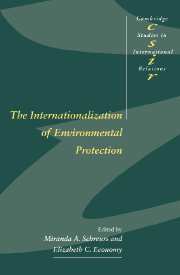Book contents
- Frontmatter
- Contents
- List of contributors
- Preface
- 1 Domestic and international linkages in environmental politics
- 2 Chinese policy-making and global climate change: two-front diplomacy and the international community
- 3 The domestic politics of global biodiversity protection in the United Kingdom and the United States
- 4 Domestic and international linkages in global environmental politics: a case-study of the Montreal Protocol
- 5 The internationalization of environmental protection in the USSR and its successor states
- 6 Domestic institutions and international environmental agendas in Japan and Germany
- 7 Zimbabwe and CITES: illustrating the reciprocal relationship between the state and the international regime
- 8 The European Union: bridging domestic and international environmental policy-making
- Index
- CAMBRIDGE STUDIES IN INTERNATIONAL RELATIONS
Preface
Published online by Cambridge University Press: 08 March 2010
- Frontmatter
- Contents
- List of contributors
- Preface
- 1 Domestic and international linkages in environmental politics
- 2 Chinese policy-making and global climate change: two-front diplomacy and the international community
- 3 The domestic politics of global biodiversity protection in the United Kingdom and the United States
- 4 Domestic and international linkages in global environmental politics: a case-study of the Montreal Protocol
- 5 The internationalization of environmental protection in the USSR and its successor states
- 6 Domestic institutions and international environmental agendas in Japan and Germany
- 7 Zimbabwe and CITES: illustrating the reciprocal relationship between the state and the international regime
- 8 The European Union: bridging domestic and international environmental policy-making
- Index
- CAMBRIDGE STUDIES IN INTERNATIONAL RELATIONS
Summary
The idea for this volume emerged out of a discussion we had in a friend's living room in Ann Arbor, Michigan in 1992. We had both recently come back from doing research on global environmental policy-making in Asia and shared many substantive and theoretical concerns. Although we had worked in countries with very different political and economic situations, we shared an interest in how the issue of global climate change reached the policy agendas in China and Japan. It was clear that in both countries the internationalization of the environment was influencing normative values and institutional structures. Yet at the same time, domestic politics continued to play an important role in determining how these two states reacted to international negotiations. We both agreed that there was a need for a more systematic appraisal of how international and domestic politics were being linked through the internationalization of environmental politics.
We knew several other scholars with an interest in environmental politics and the linkages between the domestic and international levels and applied to the SSRC-MacArthur Foundation Program on International Peace and Security for support to hold a workshop on this theme. Without this initial support, it is doubtful that this late evening discussion would have led to this book.
The first workshop was titled “Cooperation, Conflict, and the Global Environment.” A diverse group of scholars, we met for a weekend to discuss our research and to brainstorm interesting research themes. Our interests covered areas such as the United Nations Conference on Environment and Development (UNCED), the implementation of international environmental agreements, joint implementation schemes, East-West environmental cooperation, and the impacts of migration on the environment.
- Type
- Chapter
- Information
- The Internationalization of Environmental Protection , pp. xi - xivPublisher: Cambridge University PressPrint publication year: 1997

